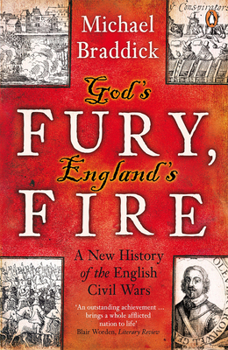God's Fury, England's Fire: A New History of the English Civil Wars
Select Format
Select Condition 
Book Overview
The sequence of civil wars that ripped England apart in the seventeenth century was one of the most devastating conflicts in its history. It destroyed families and towns, ravaged the population and led many, both supporters of Charles I and his opponents, to believe that England s people were being punished by a vengeful God. This masterly new history illuminates what it was like to live through a time of terrifying violence, religious fervour and...
Format:Paperback
Language:English
ISBN:0141008970
ISBN13:9780141008974
Release Date:January 2009
Publisher:Penguin Group
Length:784 Pages
Weight:1.23 lbs.
Dimensions:1.4" x 5.5" x 8.0"
Age Range:18 years and up
Grade Range:Postsecondary and higher
Customer Reviews
2 ratings
Splendid.
Published by Thriftbooks.com User , 14 years ago
This is the best overall history of the English Civil Wars that I have read. It concentrates on the political movements that tossed back and forth during the wars rather than accounts of battles, drama or who said what on the scaffold. This book clarifies what the Levellers, Covenanters, Presbyterians and others stood for and what, for example, was said at the great debates in Putney. The wars boiled down to one question in the end: was the King sovereign or was he subject to the law as created by the people? His refusal to plead at his trial was the culmination of the entire struggle: if he pled, he was admitting that he was subject to the law as enacted by Parliament. By refusing, he was insisting on his own sovereignty, but condemning himself to death. Britain did not resolve this issue until 1688 when William and Mary agreed to most of the things Charles did not. The author explains well the points of view of Charles and the other major players, but less so for Cromwell, who is almost a minor figure in the book. Altogether, a fine historical account.
Vigorous new history of the civil wars in Britain in the 1640s
Published by Thriftbooks.com User , 15 years ago
Michael Braddick, professor of history at Sheffield University, has written a splendid new history of the civil wars in Britain in the 1640s. The book is in three parts: the crisis of the three kingdoms (1637-42), war (1642-46), and revolution (1646-49). Part 1 describes the Scottish Prayer Book rebellion and the politics of reformation, politics and society in Charles' England, the English and the Bishops' Wars, the Long Parliament, the Irish rising, the struggle for the provinces and the slide into war. Part 2 studies the battle of Edgehill, the English war efforts in 1643, the Irish Cessation and the Solemn League and Covenant, the battle of Marston Moor, death and its meanings, the battle of Naseby and the New Model Army, the costs and benefits of civil war, and the politics of parishes at war. Part 3 describes postwar politics, attempts at settlement, the Putney debates, the Engagement and the vote of No Addresses, Charles' starting of the second civil war, his trial and execution, and England's freedom. The people opposed the king's party on the issues of royal powers, his religious policies, taxation, his foreign policy, and his Catholic advisers. Charles sought to uphold his supreme power over the people. He refused to work with Parliament or to be subject to its authority. People noted that Charles tried to stay out of war in Europe against Catholics, but was ready to go to war against his own Protestant subjects. Public opinion was such that, as Braddick writes, "Military mobilization by prerogative power in order to enforce Laudian ceremonialism would have plenty of opponents." Yet in 1649, the king was still unrepentant and uncompromising, and still bent on another war: defeated in England and Scotland, he was as yet unbeaten in Ireland. Braddick recounts the organised, disciplined and popular assertions of traditional common rights - throwing down enclosures in forests and fens, tearing up hedges, and breaking open the Earl of Middlesex's deer park and killing his deer. Tactically astute, people gathered in groups of two, thus evading the legal definition of a riot. More and more people became active citizens. People fought for the idea that "All power is originally and essentially in the whole body of the people of this Nation." As Braddick writes, "What was really new and radical ... was that fundamental questions were being debated before a public audience." It was `a decade of intense debate and spectacular intellectual creativity ... the beginnings of a passage from the world of reformation to the world of enlightenment'.






